Corporate Governance in Islamic Financial Institutions: Challenges and Opportunities
DOI: https://doi.org/10.26618/w3w8ws90
Abstrak
This study investigates the challenges and opportunities of corporate governance in Islamic Financial Institutions (IFIs) by employing a Systematic Literature Review (SLR) approach. Corporate governance in IFIs is distinct from conventional institutions due to the dual requirement of complying with international governance standards and Shariah principles. The review synthesizes findings from peer-reviewed articles published between 2019 and 2024 to provide a comprehensive understanding of the governance landscape in IFIs. The results highlight several persistent challenges, including the lack of standardization in Shariah Supervisory Board (SSB) practices, regulatory fragmentation across jurisdictions, and limited expertise among governance professionals. These challenges create inconsistencies in the effectiveness of Shariah governance and may undermine institutional credibility. However, the study also identifies considerable opportunities. Strengthening corporate governance enhances stakeholder trust, increases investor confidence, and positions IFIs as leaders in ethical and sustainable finance. Furthermore, the adoption of digital governance tools, such as blockchain and artificial intelligence, offers innovative solutions to improve transparency, accountability, and compliance monitoring. This study contributes to the literature by consolidating recent insights and proposing recommendations for harmonization, capacity building, and sustainability integration. It concludes that robust governance frameworks are critical for the long-term stability of IFIs and their role in advancing ethical finance aligned with the United Nations Sustainable Development Goals (SDGs).
Referensi
Alam, N., Gupta, L., & Shanmugam, B. (2021). Islamic finance: A practical perspective. Springer.
Ali, S., Muneeza, A., & Hassan, R. (2022). Regulatory challenges in Islamic financial institutions: A comparative perspective. Journal of Islamic Accounting and Business Research, 13(4), 521–540.
Grassa, R., & Matoussi, H. (2020). Corporate governance of Islamic banks: A comparative study between GCC and Southeast Asia. International Journal of Islamic and Middle Eastern Finance and Management, 13(2), 293–311.
International Financial Services Board (IFSB). (2023). Revised guiding principles on corporate governance for institutions offering Islamic financial services (banking segment). Islamic Financial Services Board.
Issa, J. S., & Abbaszadeh, M. R. (2023). The effect of corporate governance in Islamic banking on the agility of Iraqi banks. Journal of Risk and Financial Management, 16(2), 96. https://doi.org/10.3390/jrfm16020096
Jan, A. A., Lai, F. W., & Tahir, M. (2021). Developing an Islamic corporate governance framework to examine sustainability performance in Islamic banks and financial institutions. Journal of Cleaner Production, 315, 128099. https://doi.org/10.1016/j.jclepro.2021.128099
Kassim, S., & Majid, M. A. (2021). Fintech and governance in Islamic finance: Opportunities and challenges. ISRA International Journal of Islamic Finance, 13(3), 311–327.
Moher, D., Liberati, A., Tetzlaff, J., Altman, D. G., & PRISMA Group. (2009). Preferred reporting items for systematic reviews and meta-analyses: The PRISMA statement. PLoS Medicine, 6(7), e1000097. https://doi.org/10.1371/journal.pmed.1000097
Mollah, S., & Zaman, M. (2019). Shariah supervision, corporate governance and performance: Conventional vs. Islamic banks. Journal of Banking & Finance, 82, 100–115.
Mukhibad, H. (2022). Corporate governance and Islamic bank accountability: Effect on disclosure. Cogent Business & Management, 9(1), 2076376. https://doi.org/10.1080/23311975.2022.2076376
Simsek, R. (2024). Corporate governance structure and climate-related disclosures in banks. Corporate Social Responsibility and Environmental Management, 31(1), 130–144. https://doi.org/10.1002/csr.2485
Srairi, S. (2020). Corporate governance disclosure practices in Islamic banks: A cross-country analysis. International Journal of Law and Management, 62(1), 57–73.
Tranfield, D., Denyer, D., & Smart, P. (2003). Towards a methodology for developing evidence‐informed management knowledge by means of systematic review. British Journal of Management, 14(3), 207–222. https://doi.org/10.1111/1467-8551.00375
Ullah, S., Jamali, D., & Harwood, I. (2021). Socially responsible corporate governance in Islamic banks: Insights from stakeholder theory. Business Ethics: A European Review, 30(1), 42–57.
Zain, S. R. M., Haron, R., & Ismail, I. (2022). Board characteristics and performance of Islamic banks in Southeast Asia. International Journal of Islamic and Middle Eastern Finance and Management, 15(4), 789–807. https://doi.org/10.1108/IMEFM-04-2021-0162
Rahman, A. A., & Bukair, A. A. (2020). The influence of Shariah supervisory boards on CSR disclosure in Islamic banks. Journal of Islamic Accounting and Business Research, 11(5), 1009–1028. https://doi.org/10.1108/JIABR-05-2017-0076
Haniffa, R., & Hudaib, M. (2022). Governance, ethics, and accountability in Islamic financial institutions: A review and research agenda. Journal of Business Ethics, 180(3), 671–690. https://doi.org/10.1007/s10551-021-04934-4
Aldohni, A. K. (2021). Islamic banking and financial stability: Governance and regulatory frameworks. Global Finance Journal, 50, 100526. https://doi.org/10.1016/j.gfj.2021.100526
Farook, S., & Hassan, M. K. (2021). Risk governance and Shariah governance in Islamic financial institutions. Journal of Risk Finance, 22(2), 210–226. https://doi.org/10.1108/JRF-06-2020-0128
Belal, A. R., Abdelsalam, O., & Nizamee, S. S. (2020). Ethical banking and governance in Islamic financial institutions. Accounting Forum, 44(3), 279–302. https://doi.org/10.1080/01559982.2020.1776894
Unduhan
Diterbitkan
Terbitan
Bagian
Lisensi
Authors who publish with Invoice: Jurnal Ilmu Akuntansi agree to the following terms:
-
Copyright Ownership
The copyright of all articles published in this journal remains with the author(s). However, the authors grant Invoice: Jurnal Ilmu Akuntansi the right of first publication with the work simultaneously licensed under a Creative Commons Attribution 4.0 International License (CC BY 4.0). This license allows others to share, copy, redistribute, adapt, and build upon the work for any purpose, even commercially, as long as proper credit is given to the original author(s) and the source. -
Licensing and Access
Invoice: Jurnal Ilmu Akuntansi provides immediate open access to its content on the principle that making research freely available to the public supports a greater global exchange of knowledge. All published materials are available freely without subscription or payment and can be accessed, downloaded, and reused by any user provided that appropriate attribution is given. -
Permission for Reuse
For uses not covered by the CC BY 4.0 license, such as commercial reprints, translations, or any form of adaptation without clear attribution, users must obtain written permission from the editorial team. Requests for such permissions can be directed to the editorial office at: [invoice@unismuh.ac.id]. -
Plagiarism and Originality
Authors are responsible for the originality of their submissions. All articles are screened for plagiarism using appropriate tools before acceptance. Manuscripts found to contain unoriginal content or infringing materials will be rejected or retracted as per journal policy.














